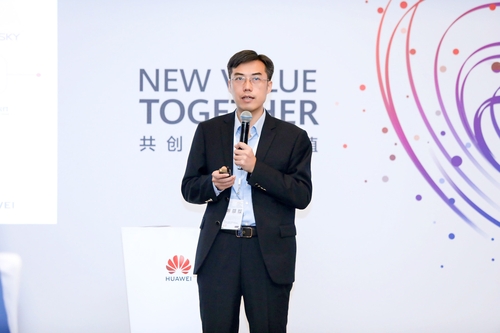Diversified Computing Power into Every Line of Code
(SHANGHAI, Oct. 12, 2020 PRNewswire=연합뉴스) Huawei held the Computing Industry Basic Software Summit in Shanghai, demonstrating the achievements made after the launch of the open source basic software projects. A basic ecosystem has been established around openEuler, openGauss, openLooKeng, and MindSpore.

Jiang Dayong introduced Huawei's basic software strategy, including software and hardware full-stack innovation, as well as how open source has accelerated innovation to drive the basic software industry forward.
Four Basic Software Projects Power Innovation of Open Source Communities
While hardware provides the foundation of computing power, basic software helps unleash the potential, and application software creates tangible value for end users. Innovation will gain speeds when a virtuous cycle is formed among hardware vendors, basic software vendors, application software vendors, system developers, software developers, and users.
Open source software is an important part of Huawei's computing ecosystem strategy. Huawei values open hardware, open source software, and partner enablement. By leading open source initiatives, contributing, and enabling business partners, Huawei supports the technical software ecosystem with continuous innovation.
In terms of community contributions, Huawei ranks No. 2 globally in the latest Linux Kernel 5.8 release. Huawei leads four open source projects: openEuler, openGauss, openLooKeng, and MindSpore, and has completed continuous integration with more than 40 mainstream communities. By contributing to upstream communities for mainstream scenarios, Huawei enables 80% of key communities to provide native support for Kunpeng. In this way, ARM developers can use these open source components easily. Such efforts all help to lay a solid groundwork for full-stack hardware and software collaboration.
Hardware is the basis of the entire ecosystem, and operating systems are the basis of software. openEuler officially went open source on December 31, 2019, and the 20.03 Long-Term Support (LTS) version was released in March 2020. After nine months of operation, the openEuler community has attracted more than 2000 contributors, set up 70 special interest groups (SIGs), and engaged more than 60 leading enterprises in China. Six top operating system vendors in China have joined the community and released commercial versions.
The innovation version, openEuler 20.09, will also be officially released on September 30, 2020. The release features 1+8: one kernel plus eight innovation projects, covering multi-core acceleration, iSula2.0 lightweight VM, StratoVirt cloud native container, BiSheng JDK, Compass CI, A-Tune intelligent tuning tool, UKUI desktop, secGear precision computing framework, and IMA integrity measurement architecture. The innovative 1+8 architecture makes openEuler the most vibrant open source community.
Databases are the gist of basic software and the core of customers' business systems. There is a gap between traditional open source databases and enterprise application expectation in terms of performance, availability, and security.
Huawei openGauss is positioned as an enterprise-grade open source database. Huawei closely works with partners to rapidly release commercial versions, meeting industry customers' requirements for high performance, reliability, and converged business processing. openGauss officially went open source on June 30, 2020, focusing on performance optimized for Kunpeng. Based on 2-socket Kunpeng servers, openGauss delivers up to 1.5 million tpmC, 50% higher than that of industry's mainstream products. In just three months, six partners have released commercial versions of openGauss. These partners also help to advance the commercial use of openGauss.
openLooKeng aims to power data analytics with the ultimate simplicity, enabling users to harness big data with the ease of database usage. Huawei will continue efforts in building unified engines, robust ecosystem, and high reliability.
openLooKeng 1.0 has been released in the community on September 23, 2020. It implements cross-source and cross-domain high-performance interactive queries, Virtual Data Marts (VDM), and unified data query without migration or conversion. In addition, openLooKeng 1.0 supports diversified analysis on a unified engine, allowing interactive analysis of hundreds of billions of data records within seconds, and collaborative analysis of hundreds of billions of data records across multiple data centers.
Build a Complete Basic Software Ecosystem, and Cultivate Talent for the Ecosystem
To accelerate ecosystem construction, Huawei will provide various support, including learning, build, and go-to-market support to help partners improve their business competitiveness. After one year's efforts, Huawei has more than 1000 ISV partners and 3000 solutions in the computing space.
Partners and developers are the foundation of the ecosystem, and talent is the future of the ecosystem. Huawei and Tsinghua University jointly released openEuler and openGauss technical books to build the basic knowledge of operating systems and databases into university courses. In the future, Fudan University, Tongji University, Huazhong University of Science and Technology, and 10 other universities will provide related courses.
In addition, the technical white paper of the openEuler 20.09 version was officially released, revealing new features and projects of the 20.09 version. The openEuler certification program will also be officially launched in October. 30 certificates of the first batch of HCIA certification will be open to openEuler.
At the summit, leading experts from the academia, media, and commercial domains joined Du Junping, General Manager of Huawei's Cloud & AI Open Source Business, to discuss the relationship between open source and business.
Wu Qingbo, one of the featured guests, believed that open source and business can only go further if they work with each other. In the education space, open source is the best means ? it features freedom and fairness.
Jiang Tao, founder of CSDN, said that business will not hinder the development of open source, but will rather boost open source. Open source embracing business is open source in a real sense.
Another featured guest, Han Qing's viewpoint was to define the success of an open source project. The first step is to create value, generate social effects, find added values in open source projects, and then produce aggregated effects through business engagement to achieve business success.
Du Junping concluded that open source allows organizations and individuals to innovate and create industry value in an open, fair, transparent, and secure environment.
Inspired by the mindset of fostering a sustainable, open source basic software ecosystem Of All, By All, For All, Huawei welcomes partners, developers, and enthusiasts to join the computing industry, working together to bring diversified computing power to the global ecosystem for shared success.
Photo - https://photos.prnasia.com/prnh/20201010/2945159-1
Source: Huawei
[편집자 주] 본고는 자료 제공사에서 제공한 것으로, 연합뉴스는 내용에 대해 어떠한 편집도 하지 않았음을 밝혀 드립니다.
(끝)
<저작권자(c) 연합뉴스, 무단 전재-재배포 금지>
관련뉴스
















